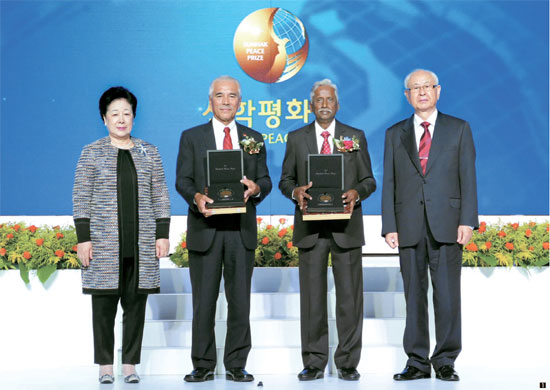
Taking a photo this past August 28 during the Sunhak Peace Prize Award Ceremony, in the picture are the founder of the Sunhak Peace Prize, Dr. Hak Ja Han Moon (far left), laureate President Anote Tong (second to right), laureate Dr. Modadugu V. Gupta (third to right), Committee Chairman Dr. Il-Sik Hong (far right).
Last August 28, the Sunhak Peace Prize Ceremony was held at the Grand InterContinental Seoul Parnas in Seoul, Korea. President of Kiribati, H.E. Anote Tong, and Indian fisheries scientist, Dr. Modadugu V. Gupta, were selected as the inaugural laureates of the Sunhak Peace Prize which was established to promote world peace and human development.
“I accept this prestigious award with the sincere hope that all who are here today and the world as a whole, have indeed taken heed of my people’s plight, my people’s fate. For their sake, let us do what is right for them.” - from the Acceptance Speech by President Anote Tong
“This award gives me the added energy to pursue my life goals of contributing to a peaceful society through alleviation of hunger and poverty. I pay homage to Reverend Dr. Sun Myung Moon for the ideals he stood for and his vision of one global peaceful family. Let us all work together to bring his ideas to reality.” - from the Acceptance Speach of Dr. Modadugu V. Gupta
Over 1,000 VIPs in attendance
Total prize money 1 million US dollars
The Sunhak Peace Prize was established to inherit the vision of Rev. Sun Myung Moon and Dr. Hak Ja Han Moon and perpetuate their legacy by recognizing individuals who have willingly sacrificed themselves for peace and awards 1 million US dollars, the highest amount for a single prize in the world. The co-recipients received a cash prize of $500,000 each.
Including the founder of the Sunhak Peace Prize Dr. Hak Ja Han Moon, Chairman of the Sunhak Peace Prize Foundation Sun Jin Moon, and Korean National Assembly Speaker Ui Hwa Chung, approximately 1,000 delegates and VIPs, representatives of politics, academia, business, and religion came from across the world to attend the Ceremony.
Committee Chairman Il-Sik Hong said, “The present generation has been given a historical calling for it to let go of its greed and selfishness, and transcend race, nation, ideals, and religion in order to create a peaceful civilization based on love for humanity,” and added, “Under the banner of ‘One Global Family, Making the World Better for Future Generations,’ The Sunhak Peace Prize will go beyond the limits of civilizations that humanity has constructed until now and create a new peaceful civilization based on love for humanity.”
The audience was touched by the beautiful harmony of Soprano vocalist Su-mi Jo and the Little Angels chorus.
After the ceremony, the laureates gave a special lecture during an international conference called “World Summit 2015.” It provided an opportunity for the attendees to address the issues of climate change and food insecurity.
On June 8, the Sunhak Peace Prize Committee announced their first laureates at the National Press Club in Washington, D.C., United States. The awardees are President of Kiribati H.E. Anote Tong, who raised the awareness of the international community on the serious impacts of climate change, and Indian fisheries scientist Dr. Modadugu Gupta who led relief efforts for the poor and the future food crises with a revolutionary method of aquaculture that produced enormous results.
During the past year, 182 candidates from 66 countries were recommended to the Sunhak Peace Prize Committee by their nominators from around the world. Through complex evaluations and a scrupulous field researching process, President Anote Tong and Dr. Modadugu V. Gupta were selected as the inaugural dual laureates. They were recognized for their sacrificial efforts to find solutions to climate change and the looming food crisis which are the agenda of the Sunhak Peace Prize.
To find solutions to climate change and the looming food crisis
They devoted themselves
Anote Tong was elected as the fifth President of the Southern Pacific island country of Kiribati and is currently serving the final year of his third term. During his tenure, he has made efforts to raise awareness of crises facing low-lying Pacific small island states due to climate change and has been urging for international cooperation.
In 2010, Pres. Tong hosted the Tarawa Climate Change Conference (TCCC) and enacted the Ambo Declaration. Representatives of the world powers including China and vulnerable states participated in the conference. The main concerns there were agreeing to the 18 points of the Declaration, and urging concrete actions to find solutions to climate change. Developed countries who attended the 2010 United Nations Climate Change Conference held in Mexico, promised their strong support to climate-vulnerable countries like Kiribati.
Pres. Tong has been nominated for the Nobel Peace Prize for his achievements and received the Peter Benchley Ocean Award and Hillary Award in 2012 for climate equity.
The co-recipient Indian fisheries scientist Dr. Modadugu V. Gupta pioneered the Blue Revolution through developing innovative aquaculture techniques as an alternative solution to the future food crisis. Dr. Gupta known as the ‘Saint of the Poor’ taught aquaculture methods to the extremely poor in Southeast Asia and Africa. He improved their nutritional status and cultivated a miracle of self-sufficiency. He also drastically changed the social status and rights of women. The World Food Prize, known as the Nobel Prize for agriculture, congratulated his awarding on their official website.
[Original Article]